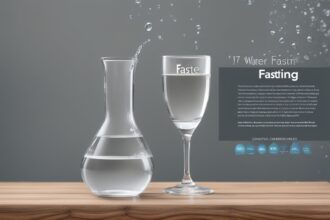Have you ever considered taking a break from food to reset your body and mind? Water fasting, a practice where you consume only water for a set period, has gained popularity for its potential health perks. Whether you’re curious about shedding a few pounds, detoxifying your system, or boosting mental clarity, the water fast benefits might just surprise you. In this post, we’ll dive into what water fasting is, explore its scientifically backed advantages, and share practical tips to help you try it safely. Let’s uncover why this ancient practice is making a modern comeback and how it could transform your wellness journey.
What Is Water Fasting and How Does It Work?
Water fasting is a type of fasting where you abstain from all food and beverages except water for a specific duration, typically ranging from 24 hours to several days. Unlike intermittent fasting, which includes eating windows, or juice fasting, which allows liquids other than water, this method is strict and focuses solely on hydration. The idea behind water fasting is to give your digestive system a rest, allowing your body to redirect energy toward healing and repair. When you stop eating, your body enters a state called ketosis, where it burns stored fat for fuel. This process is often linked to many water fast benefits, including weight loss and cellular cleanup. But how does it feel, and is it right for everyone? Let’s explore further.
Top Water Fast Benefits Backed by Science
Water fasting isn’t just a trendy fad; there’s growing research supporting its impact on health. One of the most well-known water fasting advantages is its potential to promote weight loss. By depleting glycogen stores and switching to fat-burning mode, your body can shed excess pounds quickly. Studies also suggest that fasting may improve insulin sensitivity, helping to regulate blood sugar levels—a boon for those at risk of type 2 diabetes. Additionally, water fasting triggers autophagy, a cellular process where your body cleans out damaged cells and regenerates new ones, potentially reducing inflammation and slowing aging. These water fast health benefits make it a compelling option for many, but the effects don’t stop there.
Mental Clarity and Emotional Well-Being During a Water Fast
Beyond physical changes, many people report profound mental and emotional shifts during a water fast. The absence of food-related distractions can sharpen focus and enhance mindfulness. Some studies indicate that fasting may increase the production of brain-derived neurotrophic factor (BDNF), a protein linked to improved brain health and mood regulation. This could explain why so many fasters describe feeling a sense of calm or euphoria after the initial hunger pangs subside. If you’ve been searching for ways to reduce stress or boost productivity, exploring the mental benefits of water fasting might be worth a try. Just imagine tackling your to-do list with a clearer, more focused mind!
Detoxification: Does Water Fasting Really Cleanse Your Body?
One of the most talked-about water fast benefits is detoxification. The theory is that by halting food intake, your body can focus on eliminating toxins and waste more efficiently. While the liver and kidneys naturally handle detox, fasting may support these organs by reducing their workload. Some research suggests that fasting can lower oxidative stress and inflammation, which are linked to chronic diseases. However, it’s important to note that extreme or prolonged fasting without medical supervision can sometimes do more harm than good. So, while the idea of a “cleanse” through water fasting is appealing, approach it with realistic expectations and proper guidance.
How to Prepare for a Safe and Effective Water Fast
Ready to experience the benefits of water fasting? Preparation is key to making your fast both safe and successful. Jumping into a water fast without a plan can lead to fatigue, irritability, or even health risks. Start by consulting a healthcare professional, especially if you have underlying conditions like diabetes or heart issues. Ease into the fast by reducing your food intake a few days before, focusing on light, nutrient-dense meals. During the fast, stay hydrated by sipping water throughout the day—aim for at least 2–3 liters, depending on your activity level. After the fast, break it gently with small portions of easily digestible foods like broth or fruit. Here are some additional tips to get started:
- Choose a realistic duration for your first fast, such as 24–48 hours, to test your body’s response.
- Avoid intense physical activity during the fast; opt for light stretching or walking instead.
- Listen to your body—if you feel dizzy or unwell, stop the fast and seek advice.
- Keep a journal to track your energy levels, mood, and any water fasting results you notice.
- Plan your fast during a low-stress period to minimize distractions and cravings.
Potential Risks and How to Avoid Them
While the water fast benefits are enticing, it’s not without risks. Prolonged fasting can lead to nutrient deficiencies, dehydration, or electrolyte imbalances if not done correctly. Some people experience headaches, nausea, or extreme fatigue during the initial stages as their body adjusts to the lack of food. Those with certain medical conditions or on medications should avoid fasting altogether unless under strict supervision. To minimize risks, never push yourself beyond your limits and always prioritize safety over results. Here are a few warning signs to watch for and tips to stay safe:
- Stop immediately if you experience severe dizziness, confusion, or heart palpitations.
- Avoid fasting if you’re pregnant, breastfeeding, or underweight.
- Monitor your hydration—dry mouth or dark urine could signal dehydration.
- Don’t fast for more than 72 hours without medical oversight to prevent health complications.
In conclusion, the water fast benefits—from weight loss and detoxification to mental clarity and cellular repair—make it a powerful tool for health and wellness. Backed by science and centuries of tradition, water fasting offers a unique way to reset your body and mind. However, it’s not a one-size-fits-all solution. By preparing properly, listening to your body, and seeking guidance when needed, you can safely explore the advantages of water fasting and see if it aligns with your goals. Have you tried a water fast, or are you curious to start? Share your thoughts or questions below, and let’s keep the conversation going. Remember, your health journey is personal, so take it one mindful step at a time.






